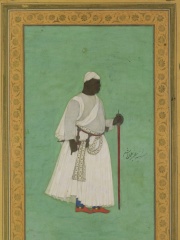

The Most Famous
MILITARY PERSONNELS from Ethiopia
This page contains a list of the greatest Ethiopian Military Personnels. The pantheon dataset contains 2,058 Military Personnels, 2 of which were born in Ethiopia. This makes Ethiopia the birth place of the 74th most number of Military Personnels behind Luxembourg, and Chile.
Top 2
The following people are considered by Pantheon to be the most legendary Ethiopian Military Personnels of all time. This list of famous Ethiopian Military Personnels is sorted by HPI (Historical Popularity Index), a metric that aggregates information on a biography's online popularity.

1. Abraha (600 - 600)
With an HPI of 72.37, Abraha is the most famous Ethiopian Military Personnel. His biography has been translated into 31 different languages on wikipedia.
Abraha (Ge’ez: አብርሀ) (also spelled Abreha, died presumably 570 CE) was an Aksumite viceroy of Himyar (modern-day Yemen) and a large part of Arabia for over 30 years in the 6th century. Originally a general in the Aksumite army that invaded Yemen around 525 CE, Abraha seized power by deposing the Christian Himyarite king installed by Kaleb. He is famous for the tradition of his failed siege of Mecca, an event that is referred to as the Year of the Elephant in Islamic tradition, using an army that included war elephants. This event is interpreted by some to be the historical context behind Surah Al-Fil, the 105th surah of the Quran. A newly discovered Himyarite inscription may mention elephants, offering potential support for this battle having taken place.

2. Malik Ambar (1548 - 1626)
With an HPI of 53.18, Malik Ambar is the 2nd most famous Ethiopian Military Personnel. His biography has been translated into 21 different languages.
Malik Ambar (1548 – 14 May 1626) was a military leader and statesman who served as the Peshwa (Prime Minister) of the Ahmadnagar Sultanate and its de facto ruler from 1600 until his death in 1626. Originally a slave from modern day Ethiopia, Chapu, as he was known then, was sold from place to place by many slave merchants, one of whom renamed him Ambar and converted him to Islam. He was eventually brought to India, where he was bought by his last owner, the Peshwa of the Ahmadnagar Sultanate. Ambar rose through the ranks at Ahmadnagar, where he created a mercenary force numbering greater than 50,000 men. He was eventually given the title "Malik" (ملِك), meaning king in Arabic. He was based in the Deccan region and was hired by local kings. Ambar became a popular Prime Minister of the Ahmadnagar Sultanate, showing administrative acumen. He is also regarded as a pioneer in guerrilla warfare in the region. He is credited with carrying out a revenue settlement of much of the Deccan, which formed the basis for subsequent settlements. He is a figure of veneration to the Siddis of Gujarat. He challenged the might of the Mughals and Adil Shahs of Bijapur and raised the low status of the Nizam Shah.
People
Pantheon has 2 people classified as Ethiopian military personnels born between 600 and 1548. Of these 2, none of them are still alive today. The most famous deceased Ethiopian military personnels include Abraha, and Malik Ambar.

